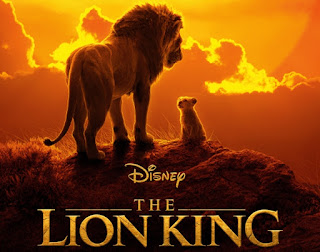The Lion King (Dir Jon Favreau, 1h 58m)
One who does not learn from history is doomed to sit through endless remakes of Disney films. Three films into the brace of four live action Disney remakes dropped into 2019 with pin-point, focus-grouped accuracy (with Lady and the Tramp landing on Disney's new streaming service later in the year), Disney have finally at least made a reasonable stab at remaking their classic. Based, nigh shot for shot, upon the 1994 animated classic, and telling the Hamlet-esque story of a young lion cub forced to reclaim the throne his uncle has usurped after the death of his father, so The Lion King brings a stunning menagerie of photorealistic animals to the screen, at the cost of any facial expressions. Yet, in its faithfulness to the original, and its admittedly impressive visual work, it at least stands head and mane above the crushingly boring Aladdin and Dumbo.
The plot of The Lion King hardly needs explaining-a young lion prince, Simba (voiced by Donald Glover as an adult, and by JD McCrary as a child) dreams of being king, and following the death of his father, Mufasa (James Earl Jones, the sole returning member of the original cast), at the hands of his uncle, Scar (Chiwetel Ejiofor, who actually tops Jeremy Irons' already strong performance), flees to the care of mismatched couple Timon (Billy Eichner) and Pumba (Seth Green). Confronted by childhood friend, Nala (Beyonce), Simba finally accepts who he is, returns home, confronts and defeats Scar, and becomes king. Aside from adding small brushstrokes of backstory into Scar and Sarabi (Simba's mother)'s backstory, there are no changes, and even large chunks of dialogue, and individual shots are kept wholesale.
One could certainly critique The Lion King for sticking as close to the original as it does-whilst some sequences are improved by twenty-five years of animation and effects, particularly the "Circle of Life" sequence and the wildebeast stampede, elsewhere it's almost slavish, cheapening or failing to quite capture the majesty of these sequences. Even in the "Circle of Life" sequence, that iconic, oft homaged shot of the sun rising over the African Savannah, tinting the entire shot a vibrant orange has been replaced by, frankly, something that more belongs to wildlife films rather than dramatic.
Herein lies, perhaps, the biggest issue, the Achilles heel of what could have been the first truly great Disney remake, in matching dramatic storytelling with impressive visuals, of this entire oddly unnecessary enterprise. In Favreau's search for admittedly impressive photorealism at all costs, he has forgotten that, unlike in his impressive Jungle Book remake, there is no human protagonist to play off against the animals, nor, seemingly as much motion capture. The result of both of these is, unfortunately stark-blank, often expressionless creatures interacting with each other, showing no emotions even in emotive moments. Whilst a couple of characters, most notably John Kani's Rafki, and Florence Kasumba's impressively menacing hyena, Shenzi, seem to have translated well via motion capture, this is sadly more that can be said for most of the rest of the cast
This extends, unfortunately to when these cameras need to speak-whilst, when these characters are silent, particularly in the case of Scar, Mufasa and the adult Simba, there is certainly a visual impressiveness, a sense of physicality to every creature on screen. Until they open their mouths, wherein, again, photorealism rears its head, and flappy mouthing that makes this film's effect sub-Babe accompanies dialogue.
This itself is a pity, given the impressive cast, and their equally impressive voice work on this film, with both Glover and Ejiofor adding a sense of increased gravitas to their character, improving, particularly in the case of their final confrontation, whilst the increasing inclusivity to the cast, now dominated by African and African American actors, is a welcome addition to the film-this together with the score and songs at least move the film somewhat above its recent peers in this regard.
But one is forced, as with the previous two Disney "live-remakes" to question what exactly the point of these films is, and these only intensify with the fact that The Lion King remains the highest grossing traditionally animated film of all time (and Disney's third highest animated grossing film of all time behind Frozen and Zootropolis). Why remake the pinnacle of Disney's Golden Age? This is not simply a sense of holding the rights of films out of the public domain for another 75 years, as with remakes of Cinderella or Malificent, nor simply greed from a studio that now holds a vice like grip on much of Western popular culture, but a studio simply pandering to nostalgia, rehashing, reheating and remaking their fare of a generation ago back up to temperature to serve it back to the generation who grew up with these film. Nowhere is this more clearly seen than in their future trajectory in remaking both Mulan and The Little Mermaid in the coming year. Like it or not, the Disney remakes are here to stay, and, at least in The Lion King, there is a sense of at least trying to measure up to the original
Rating: Recommended



Comments
Post a Comment